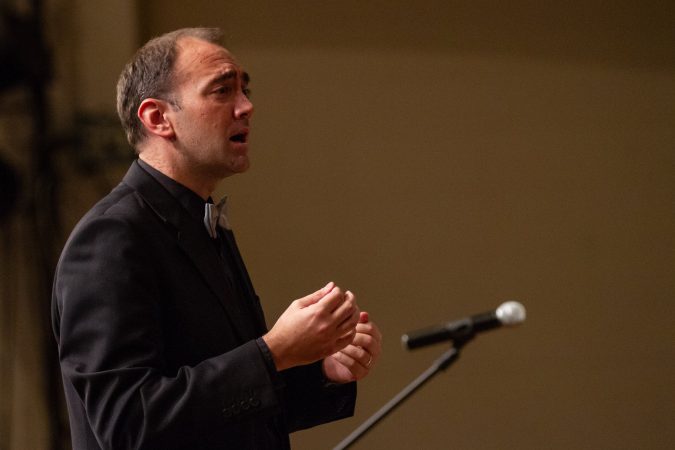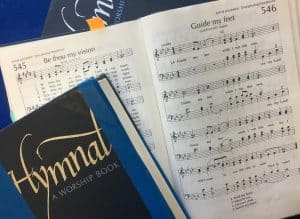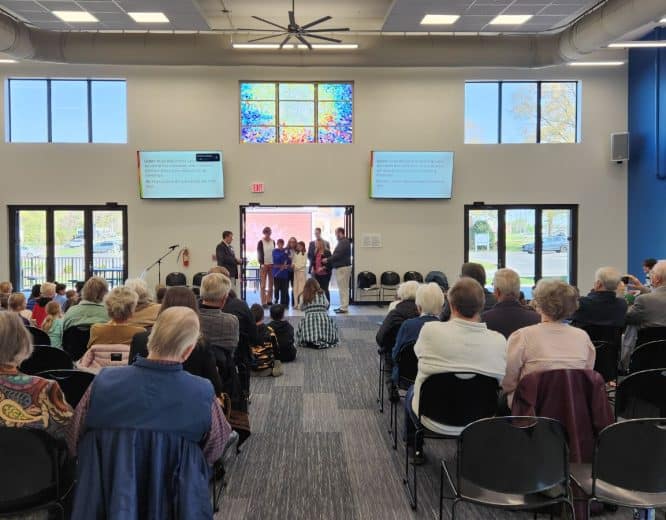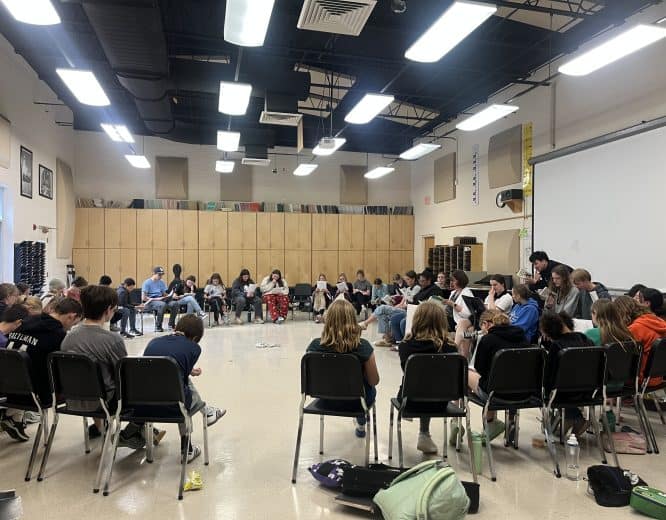Why we sing

Note: At the beginning of each school year, and periodically during the year, Jared Stuzman, music teacher and choral director, shares his philosophy of why we sing at Eastern Mennonite School. Addressing one of the first chapel gatherings of the year, Jared Stutzman, he shares:
 Under your seat, there is a blue hymnal. There is one every other seat, so you and your neighbor will need to share. Inside that hymnal, there is a song called “Guide My Feet.” It’s #546. We sing this song pretty often; it’s one of our favorites. In fact, I think Kendal Bauman has turned it into a cheer that EMS fans sing from the soccer field sideline. Other schools have a marching band and cheerleaders… we sing hymns.
Under your seat, there is a blue hymnal. There is one every other seat, so you and your neighbor will need to share. Inside that hymnal, there is a song called “Guide My Feet.” It’s #546. We sing this song pretty often; it’s one of our favorites. In fact, I think Kendal Bauman has turned it into a cheer that EMS fans sing from the soccer field sideline. Other schools have a marching band and cheerleaders… we sing hymns.
This song means a lot to us because it’s a prayer, from us to God; we’re asking God to guide us. It talks about running a race, and that’s a little bit of what we’re doing here as we start the school year. We’re going to run a race together. … and we’re saying, God, guide me. If you look to the bottom of the page, you see other words, to: God, hold my hand. God, stand by me.
If you are new to our school, if you haven’t really sung from a hymnal before, if you don’t know what all the little black dots and lines mean, that’s okay. Don’t worry about it. Just look at the words, listen, follow along, and you’ll catch on to the song pretty quickly.
Why do we sing together?
We sing because, we believe God speaks to us through each other.
I learn about God from you, and you learn about God from me. We read God’s word together, we sing together, we work and eat and talk and live together, and we are God’s voice to each other. This is the Mennonite idea. This is the Anabaptist idea, but it’s something that can make sense for “everyone,” no matter what your church background is. God speaks to us through each other.
Back in the Middle Ages 1,000 years ago, the priest would say, “I will read God’s word for you, I will tell you what it says, and I will tell you how to understand it, and the monks will sing for you. Ordinary people didn’t read the Bible and ordinary people didn’t sing. It was only for monks and priests. Martin Luther came along 500 years ago and said “No, that’s wrong. Ordinary people need to read the Bible for themselves, and ordinary people need to sing for themselves. The monk can’t praise God for you. You need to praise God for yourself. You need read the Bible for yourself, and you need to sing for yourself.”
So Martin Luther printed Bibles, and he also printed hymnals. Read the Bible for yourself, sing for yourself. The Anabaptists – the Mennonites – followed Luther, but they went one step further. They said “We read the Bible and we sing, not for ourselves, but for each other.” The priest 1,000 years ago said – “You just sit there. I’ll read for you, and I’ll sing for you.” Martin Luther said, “No, you need to read and sing for yourself. Here, have a Bible. Here, have a hymnal.” And the early Mennonites agreed, and said “Have a Bible, have a hymnal, read and sing – but for each other – not just for yourself.”
We sing for each other. You are God’s voice to me, and I am God’s voice to you.
So that means…every voice matters. If you are God’s voice to me, then I need to hear what you have to say. There is a perspective that only you can offer. You are here in our circle at Eastern Mennonite School for a reason, even if you don’t know what it is yet. There is a sound only your voice can make, and God designed your voice, God likes the way you sound, and God put you here, and God gave you that voice for us. You belong. Every voice belongs. You are here for a reason. Your voice isn’t just for you. It’s for us.
You never know quite how your voice is going to affect someone else. It doesn’t matter if you don’t sing in tune. My grandmother’s voice was not beautiful. Her harmonica-playing wasn’t going to win any awards. But I can still hear her, and I’ll carry her songs with me forever. There’s a sound only you can make that someone needs to hear. Someone out there needs to hear your voice. Someone in here needs to hear your voice.
That is why we sing together. Sing for each other. Sing for the people next to you. It doesn’t matter whether or not you know how to sing…your voice is important, and your voice matters. When we sing, sing for the people sitting around you. Sing for that one person who needs to hear God’s voice speaking through you, speaking through your singing voice, even though you might never find out about it.
The next song [#307, “Will you let me be your servant?”] is another one we sing a lot at EMS. It’s one of our favorites because it talks about serving each other. It talks about that idea of being God’s voice to each other. It says, let me be as Christ to you – I will be there for you – when you are afraid, I will speak God’s voice of calm. When you are crying, when you are laughing, I’m going to be there for you, we are showing the image of God to each other. And that’s our prayer for what our community here is, that’s who we want to be. I’ll be there for you, I’ll be Jesus to you.
“Amazing Grace” is one of the most familiar songs of all time. It’s sung by followers of Jesus everywhere, all over the world, in dozens of languages. You can go to almost any church, anywhere, and people will know this song. The reason it’s so well-known and loved is because it’s a message of grace, of God’s love for me, of God reaching out and loving me even when I am not very loveable.
Why do we sing “those” songs?
I talk about why we sing, and why we sing the songs that we do, partly for those of you who are new, in case you are wondering, but also because parents and students wonder about this, too. You know why we sing…but I am sometimes asked why we sing “these” songs, often in the context of contemporary music. “It’s 2018 – where is your contemporary praise and worship team? Let’s pump the kids up! We need to be cool!” We’re not against that at all. We include it sometimes. But we want our song choices to reflect the reasons that we sing, so our criteria are a little different, our focus is a little different.
We choose songs that are singable and inclusive for a group. We care about the vocal range. We care about male voices as well as female. We care about how complicated or difficult a song is.
We sing in a way that de-emphasizes the leader(s). Since we are God’s word to each other and every voice matters, it’s important that our music doesn’t highlight people at the front. One of the reasons Mennonites have valued harmony is because of the way it includes many different sounds in unity. Other faith traditions might prefer a single voice, a single approach to truth, a strong leader’s voice. But for us, the many different voices coming together, each adding our own sound in our own range, high voices, low voices – that’s a beautiful picture of who we are.



